

9 Things You Can Do to Support Student Agency With Formative Assessment - Next Gen Learning in Action. By Barbara Jones, a senior professional learning specialist for WestEd Sometimes when teachers see good formative-assessment lessons in action, they believe they represent unrealistic aspirations for their own classrooms.
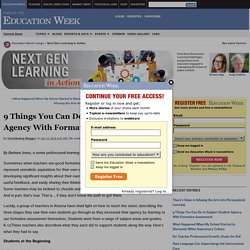
In these lessons, students may be developing significant insights about their own learning while assessing their work, giving each other useful feedback, and easily sharing their thinking with others while participating in rich discussions. Some teachers may be inclined to chuckle and say, "That could never work with my students! " And in part, that's true. That is ... if they don't know the path to get there. Teaching and Agency.pdf. Student Voice Infused Assessment Conferencing — Trevor MacKenzie. This past week I wrote my report cards.
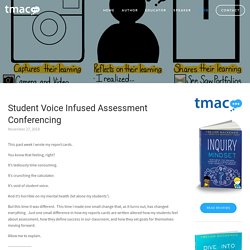
You know that feeling, right? It’s tediously time consuming. It’s crunching the calculator. It’s void of student voice. And it’s horrible on my mental health (let alone my students’). But this time it was different. Allow me to explain. It all started when my wife and I attended our 9 year old’s parent teacher interview. 1 = I seldomly do. How I Use How-To Videos in the Classroom. I would imagine most people have watched a how-to video on something—a cooking technique, home repair, or craft project.
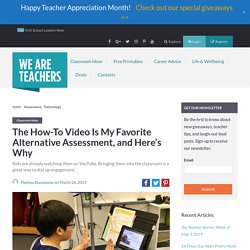
I know my music students watch similar videos; many days students have come to class proud to play the new songs they learned from YouTube: “The Pink Panther,” “Star Wars Main Theme,” and even the saxophone solo from “Careless Whisper.” This ’80s girl was proud! It got me thinking: Since students love to watch how-to videos, what if they could create them, too? The project had success written all over it. The students could demonstrate a skill necessary for class, requiring them to know it well enough to teach others. Setting up the project When introducing this project to the students, we started by watching a how-to video together and following along with the instructions. The technology My students have 1:1 iPads, which made recording easy.
The Difference Between Assessment Of Learning And Assessment For Learning - The Difference Between Assessment Of Learning And Assessment For Learning by Terry Heick What is the difference between assessment of learning and assessment for learning?
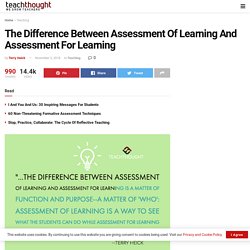
It boils down to purpose. In 50 Ways To Measure Understanding, I talked about the purpose of assessment: Is the assessment for the teacher or the student? Think like a doctor: You have to have a plan what you’re going to do with what you learn from the assessment (the data) before you give the assessment–ideally, before you even design the assessment to begin with. Resources for Assessment in Project-Based Learning. Project-based learning (PBL) demands excellent assessment practices to ensure that all learners are supported in the learning process.
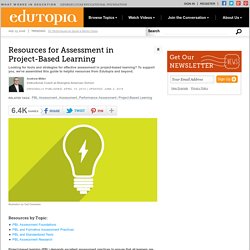
With good assessment practices, PBL can create a culture of excellence for all students and ensure deeper learning for all. We’ve compiled some of the best resources from Edutopia and the web to support your use of assessment in PBL, including information about strategies, advice on how to address the demands of standardized tests, and summaries of the research. 7 Smart, Fast Ways to Do Formative Assessment.
18 Inconvenient Truths About Assessment. 18 Inconvenient Truths About Assessment by Terry Heick For in-person professional development from TeachThought on effective assessment (or any other topic your school or district might need), contact us today.
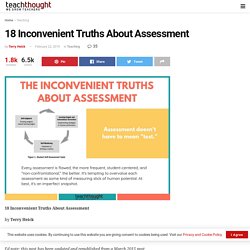
Ed note: this post has been updated and republished from a March 2015 post 1. In terms of pedagogy, the primary purpose of an assessment is to provide data to revise planned instruction. Learning – Who gets to define success? – Teaching the Teacher. Threw some serious shade into the conversations around rubrics.
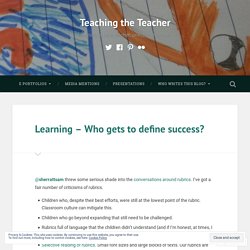
I’ve got a fair number of criticisms of rubrics. Children who, despite their best efforts, were still at the lowest point of the rubric. S3: E5 - Redefining Assessment by Implementing Gradeless Learning feat. Jeffery Frieden, Aaron Blackwelder, & Nick Covington — Human Restoration Project. On today's podcast, we're looking at the gradeless movement.
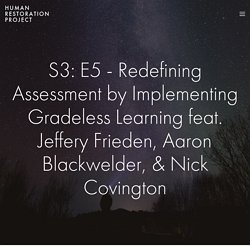
There's a lot to be debated in the education system, but I'm hard-pressed to find a topic so steeped in research as this one. Whether it be motivation, willingness to learn, and even traditional test scores, not giving a grade shows improvement across the board. There's countless research articles, books, podcasts, psychologists, education experts, and more writing and studying the effects of grades. Students should be writing their own report card comments Report card comments.
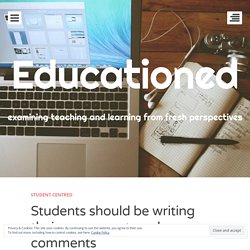
I got them. You got them. Your grandparents got them. They are another great example of antiquated educational practices that take the responsibility of learning out of the hands of the learner and place them in the hands of the teacher. Do I know how the students in my class are doing? Student-Written Reports. A while ago I read a blog post asking Should Students Write Their Own Reports?
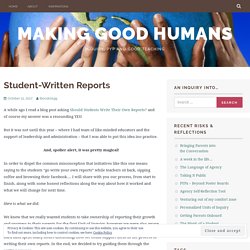
And of course my answer was a resounding YES! But it was not until this year – where I had team of like-minded educators and the support of leadership and administration – that I was able to put this idea ino practice. And, spolier alert, it was pretty magical! In order to dispel the common misconception that initiatives like this one means saying to the students “go write your own reports” while teachers sit back, sipping coffee and browsing their facebook…. I will share with you our process, from start to finish, along with some honest reflections along the way about how it worked and what we will change for next time.
Assessment done with students, not to students. I strongly believe that assessment is something that should be done with students, not something that is done to students. So this year, being back in the classroom, I wanted to put that belief into practice. 2nd Annual Conversations on the Future of Learning: Meaningful Assessment of Student Thinking to Enhance Instruction and Encourage Student Agency. On Wednesday, April 3, a group of leaders in the field of personalized learning came together for the 2nd Annual Conversations on the Future of Learning event at the Hopkins District Center. This invitation only event was organized by Associate Professor of Teacher Education Lucy Payne and Executive Fellow and Adjunct Faculty Member Tom Koch. When this event started last year, the University of St. Thomas was recognized as one of the first universities to partner with K-12 and national organization to collaborate on an event focused on student centered learning.
Lucy Payne was also selected to discuss the future of learning at a KnowledgeWorks event in February. Unlocking the Promise of Digital Assessment. For many professors, student assessment is one of the most labor-intensive components of teaching a class. Items must be prepared, rubrics created, and instructions written. The work continues as the tests are scored, papers read, and comments shared. Performing authentic and meaningful student assessment takes time. Consequently, some professors construct relatively few assessments for their courses. Assessment and Student Agency - edWeb edWebinar. Presented by Jan Bryan, Ed.D., National Education Officer, Renaissance Sponsored by Renaissance® As education leaders, we often talk about student agency—making students active participants in their own learning.
This is a major element within personalized learning and a critical component of 21st century education.